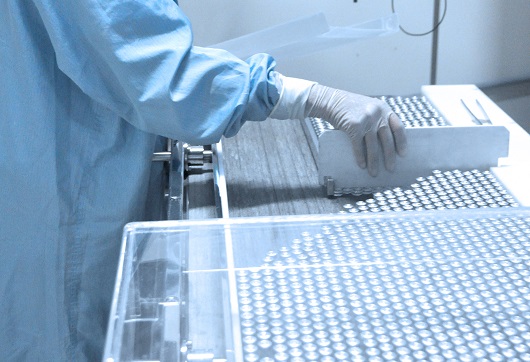WHO: Fiocruz is one of the world’s 15 main manufacturers of vaccines
25/11/2022
Gustavo Mendelsohn de Carvalho (Fiocruz News Agency)*
A survey by the World Health Organization (WHO) has placed Fiocruz among the world’s 15 main vaccine manufacturers. The 2022 Global Vaccine Market Report gives information on the dynamics of the vaccines market, based on the data provided by the WHO Member States. Subtitled A shared understanding for equitable access to vaccines, the report “aims to capture lessons from the COVID-19 pandemic and to highlight the opportunity for more ambitious global action: expanding sustainable access to vaccines for all towards the Immunization Agenda 2030 and pandemic prevention, preparedness and response efforts”. The Butantan Institute is also part of the ranking of manufacturers released by the WHO report.
Fiocruz delivers, on average, 120 million doses of vaccines annually to the National Immunization Program (PNI) (photo: Bernardo Portella, Bio-Manguinhos/Fiocruz)
“We are happy to be among the world’s main vaccine manufacturers and to have helped improve people’s health against different diseases and save lives. This is the result of decades of work by this institution and of Brazil’s tradition in public policies regarding vaccination, which involves the production of healthcare inputs, which is also observed in the presence of Butantan among the biggest manufacturers. I think it’s important to highlight the need to reduce inequalities in the production capacity for healthcare products among countries, such as vaccines, drugs and diagnostic tests, by decentralizing this production”, states Fiocruz president, Nísia Trindade Lima. “I hope more medium- and low-income countries can develop this capacity and that logic of cooperation prevails, according to the principles of the One Health approach. Together with production decentralization, the strengthening of health systems and of social protection systems, as well as continual investment in Science, Technology and Innovation in the different countries will be crucial elements to fight present and future sanitary emergencies, and to promote a single planetary health”.
In the report, the WHO General Director, Tedros Adhanom, states that although COVID-19 has highlighted the relevance of vaccines, it also shed light on inequalities regarding access to vaccines. Mentioning the example of the HPV vaccine, used to prevent cervical cancer and introduced in only 41% of low-income countries and in 83% of the world’s richest nations, Adhanom advocates more efforts in order to alleviate price disparities, as “low-income countries struggle to access vaccines that are on demand all over the world.
Through the Immunobiological Technology Institute (Bio-Manguinhos), Fiocruz figures in the report as one of the world’s 15 leading manufacturers of vaccines. The Foundation’s vaccine portfolio comprises 12 products, including vaccines against COVID-19, yellow fever, polio, and MMR (measles, mumps and rubella). On average, 120 million doses are delivered every year to the National Immunization Program (PNI, in the Portuguese acronym) of the Ministry of Health. This figure has soared in the past few years as the COVID-19 vaccines were rolled out.
*With information from CNN Brazil.





